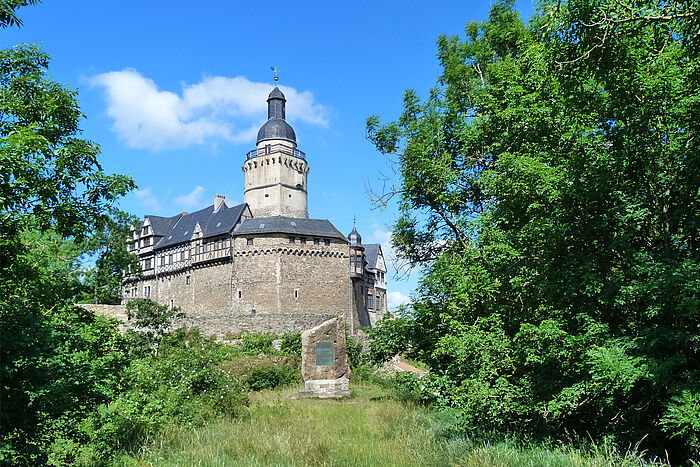Falkenstein Castle
Falkenstein Castle
- Pansfelde · Burg Falkenstein 1
- 06543 Falkenstein (Harz)
- T: +49 34743 53559-0
- F: +49 34743 53559-20
- burg-falkenstein@kulturstiftung-st.de
- www.burg-falkenstein.de
Getting here: Route planner
The public car park at the “Gartenhaus” is about 2 km away from Falkenstein Castle.
Visitors can access the castle via a road train or the castle taxi (book by phone on +49 34743 8174).
Visitors with walking difficulties and wheelchair users can access the castle via flat cobbled pathways as far as the inn, or the courtyard in the main body of the castle.
More information can be found here:
The castle in the Harz





Falkenstein Castle is the perfect place to go to experience the Middle Ages. A mighty stronghold surrounded by dense forests, it overlooks the entire Selke Valley, as any true castle should, from its perch on a hill. Entering it, there is an immediate sense of its impregnability: it is very easy to imagine attackers being deterred by the solid shield wall, the towering keep or one of the seven gates.
Falkenstein Castle goes all the way back to the 12th century and the Free Knights of Konradsburg. History was written there in the 13th century: it is said that this is where Eike von Repgow wrote his “Sachsenspiegel”, probably the most important book of German law. One thing which is certain is that the book was commissioned by Count Hoyer von Falkenstein. From 1437 until the Thirty Years' War, the complex was constantly rebuilt and expanded under new rule, this time from the House of Asseburg.
It is very fortunate that the original furnishings from this period have been preserved, for example, in the kitchen and are fully accessible, enabling visitors to be fully immersed in everyday life at that time. Make sure to see the fantastic view from the 31-metre-high keep, a demonstration of how to handle birds of prey in the falconry or a knightly meal in the “Krummes Tor” castle inn! Once a year, there is also an international “Minneturnier”, i.e. a singers’ tournament following the mediaeval tradition.
